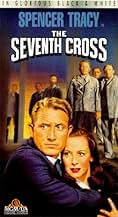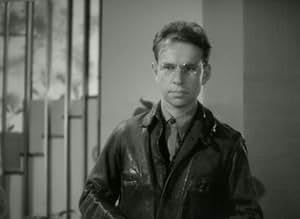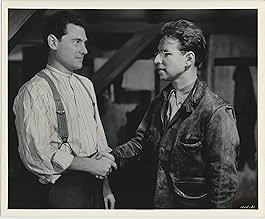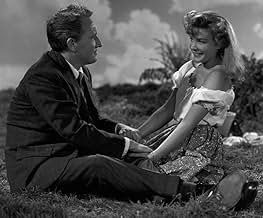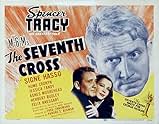AVALIAÇÃO DA IMDb
7,4/10
3,2 mil
SUA AVALIAÇÃO
Adicionar um enredo no seu idiomaSeven men escape from a Nazi prison camp. One makes it to freedom.Seven men escape from a Nazi prison camp. One makes it to freedom.Seven men escape from a Nazi prison camp. One makes it to freedom.
- Direção
- Roteiristas
- Artistas
- Indicado a 1 Oscar
- 3 vitórias e 1 indicação no total
- Direção
- Roteiristas
- Elenco e equipe completos
- Produção, bilheteria e muito mais no IMDbPro
Avaliações em destaque
In the fall of 1936, the Germans are purging the rebels and sending them to the Concentration Camp of Westhofen. One day, there is a break out and the prisoners Pelzer, Bellani, Aldinger, Beutler, Fuellgrabe, George Heisler (Spencer Tracy) and the leader Ernst Wallau escape. They are hunted down by the soldiers and the camp commandant builds seven crosses to put each escapee on each cross. The bitter George Heisler heads to his hometown Mainz without any help and loses his faith in the German people. Meanwhile one by one of the prisoners are captured by the German soldiers.
Once in Mainz, George seeks out his former girlfriend Leni (Karen Verne) that said that would wait for him but she is married and refuses to help him. Then he witnesses the suicide of Bellani and he meets his friend Mme. Marelli (Agnes Moorehead) that gives clothes and some money that she was keeping for Bellani to him. When George finally arrives at the address of his contact, he discovers that he had been arrested by Gestapo. Without any alternative, George decides to risk and visit his friend Paul Roeder (Hume Cronyn) and Liesel Roeder (Jessica Tandy). Meanwhile there are friends of George that want to help him but do not know where he is. Paul decides to help George with the support of his friend Fiedler (Paul Guilfoyle) and they bring George to an inn. But the waitress Toni (Signe Hasso) recognizes George and there is a reward of five thousand-Marc on him. What will happen to George?
"The Seventh Cross" is a dramatic and emotional movie with a great story of lost and regain of faith in the mankind. The story follows George Heisler and is anguishing, especially because the characters live in a dark period where it is not possible to know who is reliable or not. The conclusion is another plus in this great feature. My vote is eight.
Title (Brazil): "A Sétima Cruz" ("The Seventh Cross")
Once in Mainz, George seeks out his former girlfriend Leni (Karen Verne) that said that would wait for him but she is married and refuses to help him. Then he witnesses the suicide of Bellani and he meets his friend Mme. Marelli (Agnes Moorehead) that gives clothes and some money that she was keeping for Bellani to him. When George finally arrives at the address of his contact, he discovers that he had been arrested by Gestapo. Without any alternative, George decides to risk and visit his friend Paul Roeder (Hume Cronyn) and Liesel Roeder (Jessica Tandy). Meanwhile there are friends of George that want to help him but do not know where he is. Paul decides to help George with the support of his friend Fiedler (Paul Guilfoyle) and they bring George to an inn. But the waitress Toni (Signe Hasso) recognizes George and there is a reward of five thousand-Marc on him. What will happen to George?
"The Seventh Cross" is a dramatic and emotional movie with a great story of lost and regain of faith in the mankind. The story follows George Heisler and is anguishing, especially because the characters live in a dark period where it is not possible to know who is reliable or not. The conclusion is another plus in this great feature. My vote is eight.
Title (Brazil): "A Sétima Cruz" ("The Seventh Cross")
Seven prisoners escape from a German concentration camp, and the Nazi commander vows to capture and crucify all of them. One by one they are captured in some harrowing scenes and put up on the crosses outside the camp. The seventh cross, already placed, awaits the final escapee - played by a desperate Spencer Tracy. The fear and claustrophobia of being trapped, even as an escapee, inside Nazi Germany is easily seen through Tracy's able eyes. Most notable is the German couple that eventually aids Tracy despite their fear; they are played touchingly by the famous husband and wife team of Hume Cronyn and Jessica Tandy, two of the great actors of our age. Signe Hasso plays a lovely but lonely maid with whom Tracy and she have a touching emotional connection. The hope symbolized by the couple and the maid within the darkness of Nazi Germany is at the core of the film. The issue of Tracy's escape - or non-escape - is almost irrelevant by then: the glimmer of humanity is seen even among the German people. Despite the apparent pessimism of the film, it is optimistic at its heart. And it is charming and beautifully done. Not to be missed.
I saw this movie for the first time at the tender age of 10; at the time I obsessed over the concept of WW2 and the reasons behind it. Even at 10, I understood the impact that this movie must have had on so many people around the world. The movie was actually banned in Germany because of its terrifying portrayal of the Nazis and their regime. With its controversial content, one might wonder why the movie was even made to begin with. As an adult, I appreciate this movie so much more than I did when I was young, mostly for its honesty and its hopeful message.
Even though the movie contains a lot of violence and graphic depictions (at least from a 1940's perspective), I think the movie is fine for children to watch. In fact, the events in the movie are quite accurate; therefore, the movie might be a nice history lesson.
Watch and you'll see! The seventh cross will hold a place in your heart for years to come.
Even though the movie contains a lot of violence and graphic depictions (at least from a 1940's perspective), I think the movie is fine for children to watch. In fact, the events in the movie are quite accurate; therefore, the movie might be a nice history lesson.
Watch and you'll see! The seventh cross will hold a place in your heart for years to come.
A truly outstanding film that has not received the distinction that it deserves, despite a first-rate cast and compelling, as well as unique for the time, subject matter.
Spencer Tracy plays George Heisler, one of seven prisoners escaping from a German concentration camp in 1936. The film traces his attempt to establish contact with the German resistance movement, and along the way he changes slowly from a hardened cynic, and regains his faith in mankind.
This is not a bang-bang action movie. The lack of overt violence is what makes gives the film a searing authenticity. This is based on a novel by Anna Seghers, whose husband was indeed imprisoned in a concentration camp. True, people knowledgeable about the era will find many technical errors. For one thing, all of the actors, including especially Tracy and Ray Collins, are simply too overfed to be believable concentration camp inmates. Also the film shows the SA running the camp, when I do believe the SS was running the camps by '36. I was not especially happy with the handling of the single Jewish character, who is a token character and not portrayed very favorably.
But this was 1944, not 1994, and this was the first film from Hollywood to depict concentration camps. Also I can't think of very many films that have more successfully captured the terror and despair of Nazi Germany, and also more clearly impart a moral message. In that regard it is very faithful to the book.
The performances by all, even the bit characters, are superlative. This was one of Spencer Tracy's finest roles, and supposedly the melancholy of his performance was to a large extent influenced by word that a young friend, who he knew from Boy's Town, had died in combat.
Cronyn and Tandy play Liesl and Paul Roeder, who try to help George Heisler. What makes this a very fine drama is how even secondary and bit characters are shown to change and evolve. Watch for Helene Weigel, wife of Bertold Brecht, playing an old female janitor watching Roeder being taken away in a car. Weigel was the inspiration for Brecht's Mother Courage.
Seghers was a Communist, as are the major characters of the book, and the politics of the author simmers below the surface without being explicitly expressed. Look closely at the characters playing Nazis and concentration camp guards, and generally most of the characters with accents. The majority are refugees from Nazi Germany, adding great authenticity to their performances.
Spencer Tracy plays George Heisler, one of seven prisoners escaping from a German concentration camp in 1936. The film traces his attempt to establish contact with the German resistance movement, and along the way he changes slowly from a hardened cynic, and regains his faith in mankind.
This is not a bang-bang action movie. The lack of overt violence is what makes gives the film a searing authenticity. This is based on a novel by Anna Seghers, whose husband was indeed imprisoned in a concentration camp. True, people knowledgeable about the era will find many technical errors. For one thing, all of the actors, including especially Tracy and Ray Collins, are simply too overfed to be believable concentration camp inmates. Also the film shows the SA running the camp, when I do believe the SS was running the camps by '36. I was not especially happy with the handling of the single Jewish character, who is a token character and not portrayed very favorably.
But this was 1944, not 1994, and this was the first film from Hollywood to depict concentration camps. Also I can't think of very many films that have more successfully captured the terror and despair of Nazi Germany, and also more clearly impart a moral message. In that regard it is very faithful to the book.
The performances by all, even the bit characters, are superlative. This was one of Spencer Tracy's finest roles, and supposedly the melancholy of his performance was to a large extent influenced by word that a young friend, who he knew from Boy's Town, had died in combat.
Cronyn and Tandy play Liesl and Paul Roeder, who try to help George Heisler. What makes this a very fine drama is how even secondary and bit characters are shown to change and evolve. Watch for Helene Weigel, wife of Bertold Brecht, playing an old female janitor watching Roeder being taken away in a car. Weigel was the inspiration for Brecht's Mother Courage.
Seghers was a Communist, as are the major characters of the book, and the politics of the author simmers below the surface without being explicitly expressed. Look closely at the characters playing Nazis and concentration camp guards, and generally most of the characters with accents. The majority are refugees from Nazi Germany, adding great authenticity to their performances.
This film has one of the most unusual styles of the day. In many ways, its narration by Ray Collins is very reminiscent of the narration by William Holden in SUNSET BOULEVARD. That's because like Holden, Collins is dead and gives the narration post-mortum! A strange plot device but very effective for this sort of film.
THE SEVENTH CROSS is a propaganda film meant to solidify the people back home in the war effort against Nazi Germany. However, the film is set in 1936--three years before the war began. The film finds seven political prisoners escaping from a concentration camp. The whole "seven crosses" reference regards the Commandant's (George Zucco) pronouncement that each of the seven men will be tracked down and hung from these crosses in the courtyard of the prison until they are dead--as a lesson to all those who would dare to consider escaping.
The main character of the film is Spencer Tracy. What makes this performance interesting is that he says almost nothing through much of the film. Collins narrates and things occur around Tracy, but he's so hollow and beaten by life in the camp that he just stares with a somewhat vacant look. As the film unfolds, his performance opens up as well--showing more and more of the familiar Tracy as he slowly recovers from the agonies of his confinement.
The rest of the cast is quite impressive. Many exceptional character actors (such as Felix Bressart, Hume Cronyn and his wife Jessica Tandy, Agnes Moorehead) were gleaned from the MGM roster for the film. Additionally, if you look at the extended list of the cast, you'll see that it is huge---much, much larger than usual. It's obvious that the studio pulled out all the stops to make this a first-rate production.
Overall, a very successful film because unlike some wartime films, this one is timeless and can be enjoyed and admired today because it is a very well made film--with a taut script and excellent acting. As I said, some wartime propaganda films don't work as well today because they are shrill and simplistic. This film has depth and has more to offer than usual.
THE SEVENTH CROSS is a propaganda film meant to solidify the people back home in the war effort against Nazi Germany. However, the film is set in 1936--three years before the war began. The film finds seven political prisoners escaping from a concentration camp. The whole "seven crosses" reference regards the Commandant's (George Zucco) pronouncement that each of the seven men will be tracked down and hung from these crosses in the courtyard of the prison until they are dead--as a lesson to all those who would dare to consider escaping.
The main character of the film is Spencer Tracy. What makes this performance interesting is that he says almost nothing through much of the film. Collins narrates and things occur around Tracy, but he's so hollow and beaten by life in the camp that he just stares with a somewhat vacant look. As the film unfolds, his performance opens up as well--showing more and more of the familiar Tracy as he slowly recovers from the agonies of his confinement.
The rest of the cast is quite impressive. Many exceptional character actors (such as Felix Bressart, Hume Cronyn and his wife Jessica Tandy, Agnes Moorehead) were gleaned from the MGM roster for the film. Additionally, if you look at the extended list of the cast, you'll see that it is huge---much, much larger than usual. It's obvious that the studio pulled out all the stops to make this a first-rate production.
Overall, a very successful film because unlike some wartime films, this one is timeless and can be enjoyed and admired today because it is a very well made film--with a taut script and excellent acting. As I said, some wartime propaganda films don't work as well today because they are shrill and simplistic. This film has depth and has more to offer than usual.
Você sabia?
- CuriosidadesFirst joint film appearance of real life couple Hume Cronyn and Jessica Tandy.
- Erros de gravaçãoWhen the escapees are being hunted, the only uniformed personnel we see chasing them are the 'Storm troopers' (Sturmabteilung) or SA. Even before the 'night of the Long Knives', the SA would not have been the only group to search for escapees & by 1936, the hunt would also have been carried out by the regular police and the Schutzstaffel (SS).
- Citações
George Heisler: There are no better men than Paul Roeder.
- Versões alternativasThere is an Italian edition of this film on DVD, distributed by DNA srl, "LA SETTIMA CROCE (1944) + THE SEARCH (Odissea tragica, 1948)" (2 Films on a single DVD), re-edited with the contribution of film historian Riccardo Cusin. This version is also available for streaming on some platforms.
- ConexõesFeatured in Twenty Years After (1944)
Principais escolhas
Faça login para avaliar e ver a lista de recomendações personalizadas
- How long is The Seventh Cross?Fornecido pela Alexa
Detalhes
Bilheteria
- Orçamento
- US$ 1.300.000 (estimativa)
- Tempo de duração1 hora 52 minutos
- Cor
- Proporção
- 1.37 : 1
Contribua para esta página
Sugerir uma alteração ou adicionar conteúdo ausente

Principal brecha
By what name was A Sétima Cruz (1944) officially released in India in English?
Responda

